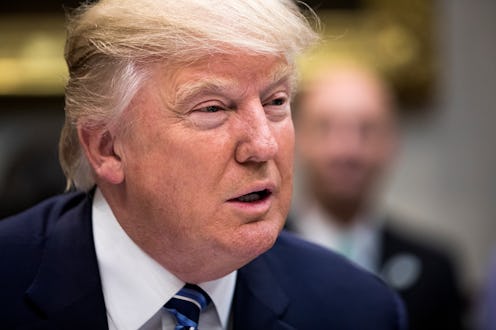News
Trump Has Promised To Honor The One China Policy

President Donald Trump raised eyebrows last December when he had a phone conversation with Tsai Ing-wen, the president of Taiwan. In doing so, Trump seemed to break diplomatic protocol, specifically in terms of the relationship between China and the United States. But what is the "One China" policy? On Thursday, for the first time since his inauguration, Trump spoke with China's president and reportedly expressed support for the policy.
Under the One China policy, the United States has formal relations with mainland China instead of the island of Taiwan. The reasons for this harken back to the Chinese civil war; in 1949, the defeated Nationalist party fled to Taiwan, thereafter known as the Republic of China. On the other hand, the Communists took over the mainland, which became known as the People's Republic of China. The People's Republic of China has continued to claim sovereignty over Taiwan, threatening the use of military force if Taiwan formally declares independence.
Beijing also generally cuts off ties with nations that officially recognize Taiwan. The United States originally had an embassy in Taipei, but this changed in 1979 when formal ties were established with mainland China. Through a joint communiqué, the U.S. government stated that “the United States of America acknowledges the Chinese position that there is but one China and Taiwan is part of China.” Still, the United States passed the Taiwan Relations Act, allowing the country to maintain unofficial ties to the nation. The United States continues to sell arms to Taiwan, ostensibly to help Taiwan defend itself.
Many are wondering if Trump's phone call to Taiwan would mean a shift in the United States' position on the One China policy. After all, Chinese President Xi Jinping hadn't spoken to Trump since Nov. 14, before he called Tsai, the New York Times reported. Trump himself had expressed doubts about the policy, telling Fox News Sunday last December, "I fully understand the 'One China' policy, but I don't know why we have to be bound by a 'One China' policy unless we make a deal with China having to do with other things, including trade."
But Xi's icing-out of Trump seems to have had its intended impact; during a Feb. 9 phone call the White House described as "extremely cordial," Trump told Xi the U.S. government will acknowledge and adhere to the One China policy, the New York Times reported. Chinese state news media said that Xi and Trump had agreed about the "necessity and urgency of strengthening cooperation between China and the United States," according to the New York Times.
Before his conversation with Xi, Trump had his national security adviser, Michael Flynn, personally deliver a letter to the Chinese ambassador to the United States, the Times reported. Trump wished "the Chinese people a happy Lantern Festival and prosperous Year of the Rooster," according to the Times. It seems pretty clear that despite his earlier comments about U.S.-China relations, the United States is likely to keep respecting the One China policy.